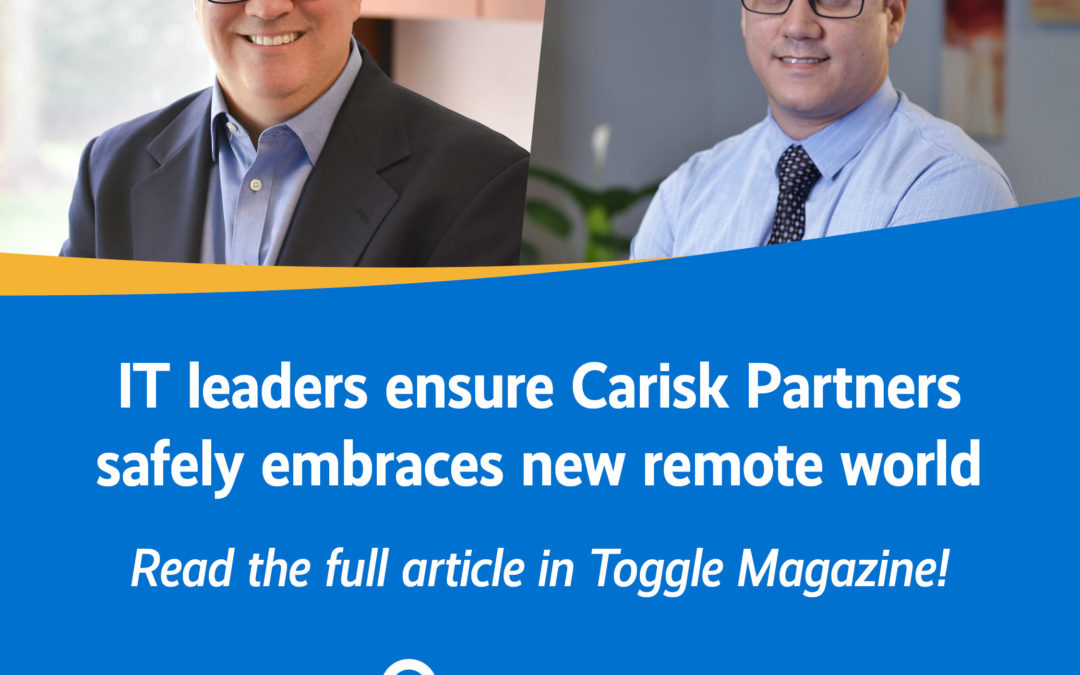Toggle Magazine Article Written by: David Harry Produced by: Zachary Brann & Matt Schwach
Mary was 25 when she sustained injuries to her arms, eyes, face and upper body after a chemical explosion at work in November 2020. Her hand was amputated and she was severely traumatized by the explosion and had to postpone her wedding.
While working to recover physically from the explosion, Mary was also able to get help for her emotional injuries and distress while working with Carisk Partners.
Its Pathways 2 Recovery approach combines best practices in clinical and behavioral health care through its specialty risk transfer or fee for service solutions, say Allen Spokane and Humberto Moya.
Certified by the National Committee for Quality Assurance, or NCQA, and Accreditation Association for Ambulatory Health Care, or AAAHC, Carisk Partners also matches injured workers with providers and customized care plans.
Mary is more succinct.
“It gave me my life back,” she says.
The possibility of remote
Moya is the vice president of IT and Spokane is the chief technology officer. Each joined Carisk Partners as the company acquired the businesses they had been working for. Together, they’ve overseen new technology integrations as the company made additional acquisitions. They’ve also enabled the entire company to work from home during the COVID-19 pandemic.
“We try to create an environment where people are coming to IT without hesitation,” Spokane says. “We’re building an IT team and function that’s an innovative problem solver.”
Coming to IT became a challenge as the company began operating remotely in response to the pandemic. The shift needed to happen quickly, Spokane and Moya recall.
In addition to providing worker’s comp services for insurers, Carisk Partners coordinates medical care and support for patients in clinical and behavioral health services (including addiction and substance use disorders) as well as radiology and imaging services. Those services couldn’t be put on hold.
Moya and Spokane credit Chris Conemac, founder of longtime vendor Network Extreme, for making the shift to remote work seamless.
Spokane says many of the employees had weak or faulty internet connections at home. Working with Conemac’s team at Network Extreme, Carisk was able to add a secure remote desktop protocol connection within days without complicated configurations or providing new equipment.
The additional risk of remote work is Carisk Partners has to comply with patient privacy data protection regulations, such as the Health Insurance Portability and Accountability Act, or HIPAA. Moya and Spokane say a cloud migration that was completed just before the pandemic hit provides secure remote access from employee’s devices without setting up a virtual private network.
“We never missed a beat to go virtual,” Spokane says. “Employees’ home PCs became terminals. When they disconnected, the computer went back to being a basic PC.”
Settled and secure
Moya and Spokane helped guide getting the company’s SOC2 certification for its management of customer data and privacy practices. Cybersecurity has been upgraded to require two-factor authentication to access private cloud and online portals.
They also lead training needed to onboard employees and, separately, educate them on phishing and social engineering.
As Moya notes, remote work is here to stay at Carisk Partners. It’s been effective and has allowed the business to recruit talent from around the U.S.
However, both are challenged in providing IT service and miss the camaraderie of office environments. Even if a hybrid office environment now means people are assigned to places that may be used by someone else the next day, providing assistance and solutions can be easier.
“There are challenges from a technical perspective, some things are more difficult,” Spokane says. “Some things require being logged into a domain to get done and working remotely makes that a challenge.”
“There are times when someone has to be there to solve problems,” Moya adds.
Two paths to one tech result
Spokane is a Pittsburgh native who earned his bachelor’s degree in management from Ithaca College in 1990. He says he was intending to major in computer science but didn’t enjoy the math courses that were required, so he minored in computer science and began a career still centered in IT.
During his career, Spokane has helped guide IT operations for a direct marketing company, a developer of customer relationship management software, a medical services provider and was executive vice president for operations and technology for Total Repair Express. He joined iHCFA as chief technology officer in March 2013. When the company was acquired by Carisk Partners (then known as Concordia Care) in 2017, he became its CTO.
Spokane is also a past president and current trustee for the Society for Information Management.
A native of Bayamo, Cuba, Moya comes from a family of doctors but says he enjoyed learning about technology “because I could do it on my own.”
He earned a bachelor’s degree in telecommunications engineering from Universidad de Oriente, and a bachelor’s degree in IT engineering from Universidad de Granma in 2007. He came to the U.S. after earning his second bachelor’s degree, noting his ambition was to work for the California-based online retailer TigerDirect.
Instead, Moya started as a software developer for IOS Health Systems in 2008. While rising through the company to become senior development lead and then project manager and software architect, Moya also earned his master’s in information systems from Florida International University in 2013.
In March 2014, he joined Preferred Medical Plan Inc. as its business application manager. In June 2015, he became director of IT for Concordia Behavioral Health, now the Carisk behavioral health division. He became vice president of IT for Carisk Partners in April 2018.
“We’re powered by next generation technologies to better serve our employees and customers,” Moya says. “We have people from 13 or 14 states working here now, and that keeps going up. Carisk’s use of technology improves patient experience and engagement. It’s core to our business strategy.”
Article originally posted here: https://www.togglemag.com/case-studies/allen-spokane-carisk-partners-llc





